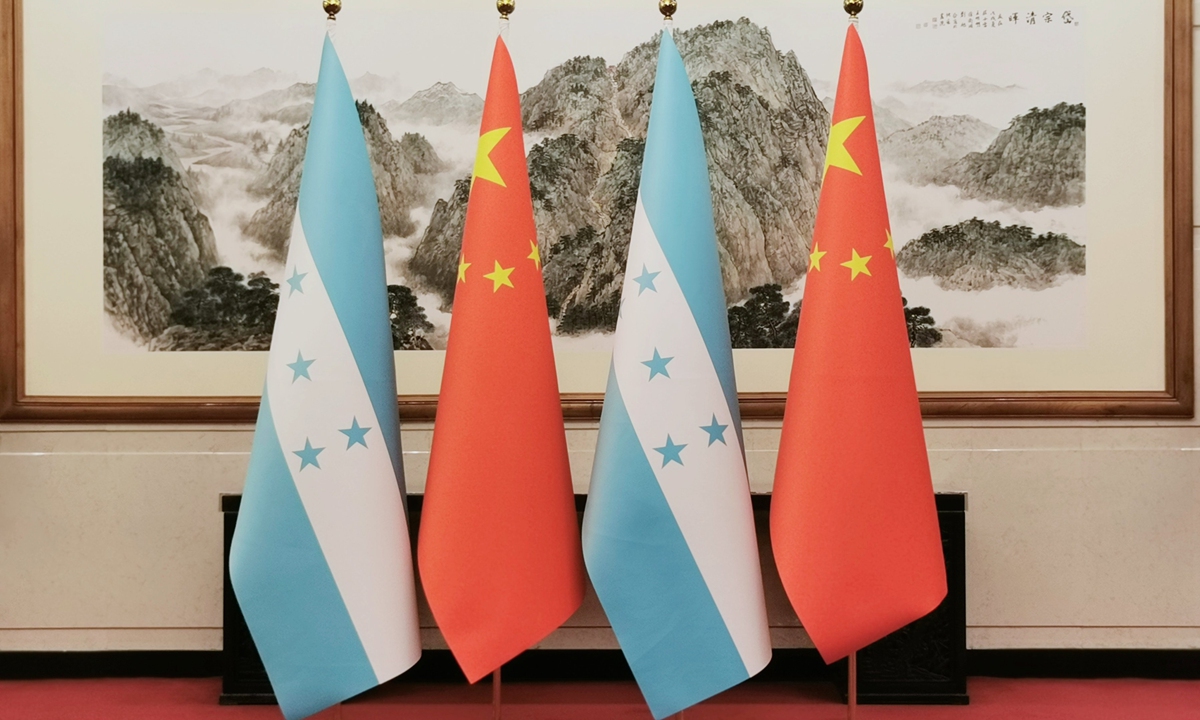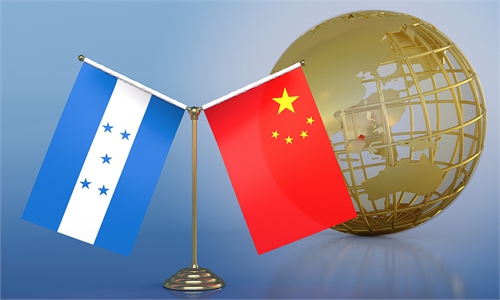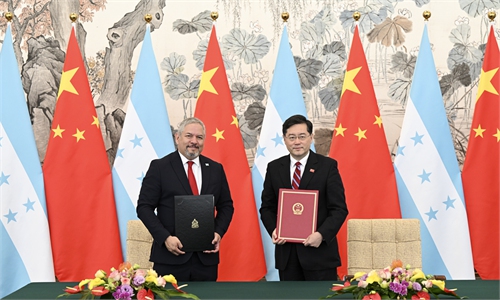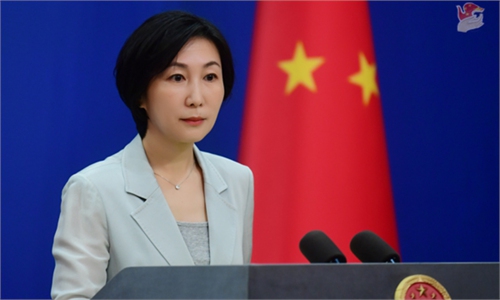China-Honduras economic and trade cooperation enjoys bright prospects: businessmen
Cooperation with Latin America has brought region tangible development dividends

A view of the island of Roatan in Honduras Photo: VCG
The overseas Chinese community in Honduras has longed for the establishment of diplomatic ties between China and Honduras for a long time, Xie Zuoqi, a representative from Association of Fujian in Honduras, told the Global Times on Sunday.
"We are all very excited to hear the news of the establishment of diplomatic ties. Our Fujian association is also preparing to host a celebratory event together," said Xie.
Xie is among the people from the two countries that welcome the long-awaited and much-anticipated establishment of bilateral diplomatic relations.
On Sunday, Chinese State Councilor and Foreign Minister Qin Gang and Honduran Foreign Minister Eduardo Enrique Reina met in Beijing and signed a joint communique establishing diplomatic relations between China and Honduras. The two sides agreed to develop friendly relations on the basis of the principles of mutual respect for sovereignty and territorial integrity, mutual non-aggression, non-interference in each other's internal affairs, equality, mutual benefit, and peaceful coexistence.
Honduras therefore became the 182nd country to establish diplomatic ties with China, according to the Ministry of Foreign Affairs.
By following the Five Principles of Peaceful Coexistence, China stands ready to enhance friendly cooperation with Honduras in various fields to the benefit of our two countries and peoples, the foreign ministry said.

China Honduras photo
Much-anticipated
"After the establishment of diplomatic ties between China and Honduras, it will be more convenient for Chinese nationals in the country to apply for visas, passports, and gain access to a host of other services, and they will feel more assured and confident in doing business in Honduras," said Xie.
Xie is a second-generation Chinese-Honduran. "Chinese immigrants in Honduras have a long history, and there are many third- or fourth-generation people of Chinese descent living and doing business in Honduras," said Xie.
He revealed that before the official establishment of diplomatic ties between China and Honduras, it was difficult for Chinese citizens to go to Honduras for business and tourism.
"I believe that after the establishment of diplomatic ties, exchanges will be more convenient and there will be more economic, trade, and cultural ties among other forms of cooperation, which will benefit people in both countries," said Xie.
Xu Xiaolei, marketing manager at China's CYTS Tours Holding Co, told the Global Times on Sunday that before the establishment of diplomatic relations between China and Honduras, Chinese travel agencies were not allowed to organize tours to the country.
Foreign Minister Qin Gang emphasized in the joint statement that tourism is one of the five key areas of relations to be developed.
"Honduras is a country that's rich in tourism resources in Central America, characterized by the Mayan civilization, marine scenery, and tropical rainforests, which are all good tourism resources, so we will conduct studies in the field of tourism cooperation between the two countries," Xu said.
Huge potential
China welcomes Honduran president's visit to China at an early date and invites Honduras to organize a delegation of entrepreneurs to China to discuss cooperation in trade, tourism investment and more, said Qin, adding that efforts should be made to seek synergy and conduct cooperation in the fields of culture, education, media, tourism and more as soon as possible.
Reina said that Honduras is ready to strengthen cooperation with China in such areas as finance, trade, infrastructure, science and technology, culture and tourism, and increase communication and coordination within multilateral frameworks.
According to Xie, Honduras is rich in marine and mineral resources. Chinese businessmen and tourists are welcome to do business in and to travel to Honduras.
Bilateral trade in 2022 reached $1.589 billion, of which $1.56-billion-worth accounted for Chinese exports and $29.239-million-worth accounted for Chinese imports, according to statistics from the General Administration of Customs of China (GAC).
Analysts said that as one of the least-developed countries in Latin America, Honduras can further promote trade and investment, expand its export market, and thus boost its economy and improve people's livelihoods after the establishment of diplomatic ties with China.
China, as the second-largest economy in the world, has a huge market with 1.4 billion people. Since the establishment of diplomatic ties, the two sides have seen huge potential for cooperation in investment, infrastructure construction, tourism, and mining, Jiang Shixue, a professor with the Center for Latin American Studies at Shanghai University, told the Global Times on Monday.
"Despite the pressure of the US, Honduras chose to establish diplomatic ties with China, which shows that the one-China principle is an international consensus, and this consensus is becoming more and more influential in the world," said Jiang.
Analysts noted that China's growing economic presence and political influence in Central America and the Caribbean region has changed the way countries in the region view China.
Panama, El Salvador, and Nicaragua, which have established or restored diplomatic ties with China in recent years, have received tangible development dividends, which is undoubtedly a contributing factor for Honduras, analysts pointed out.
According to official statistics, as of 2022, China was the second-largest trading partner to Latin America and the largest trading partner to the region's nine countries - Cuba, Paraguay, Argentina, Chile, Brazil, Uruguay, Peru, Bolivia, and Venezuela.
Total trade between China and Latin America reached $485.79 billion in 2022, up 7.7 percent year-on-year, according to the GAC. China-Latin America trade has increased 40-fold since 2000.
According to GAC statistics of the top 10 export categories of China to Latin American countries in 2022, the dominant Chinese export products are electric motors, mechanical appliances, vehicles and spare parts, steel, chemicals, and other industrial manufactured products, as well as furniture, clothing, toys and other consumer goods.
Based on the current trend of trade between China and Latin America, the bilateral trade volume is expected to exceed $700 billion by 2035, when China will possibly surpass the US as Latin America's largest trading partner, according to analysis conducted by cngold.org.



